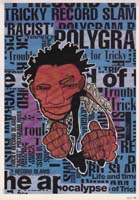|
|
|
| Exposing music biz hypocrisy or biting the hand that feeds him? Tricky turns virus in the industry apparatus | |
| TRICKY
Angels With Dirty Faces ISLAND · Tricky's third album proper,
recorded in New York, New Orleans, LA and The Bahamas.
In the 1938 film Angels
With Dirty Faces, James Cagney and Pat O'Brien play a pair of ghetto
youths whose lives pursue wildly diverging paths: one becomes an
ultra-violent gangster, the other a priest. Rather than exploit a simplistic
Good vs Evil dichotomy, however, the denouement suggests that things are
never that straightforward.
|
P-funk where
the P stands for paranoid, proof that the 3000 dread-head dope advocates
who stumbled around Trafalgar Square recently are only the second-best
argument for not decriminalising the 'erb. The first is that if you smoke
as much as Tricky, you end up seeing demons in your wallpaper. Or in your
record company offices.
Tricky no longer wants to take us down the corridors of his mind: he wants to take us down the corridors of Polygram. This isn't a new theme (see 'Tricky Kid', and 'The Divine Comedy' the recent bootleg white label on which he alleges racism within his own record company), but 'Angels' is sufficiently obsessed with what he calls "this industry full of vomit" to qualify as a concept album: a random scan on the search button might read "fame... radio air-play media... promotional click... industry bitches... A&R... signed up contracts... career... business... Brits Awards... corporate... record companies ." Tricky's real cousin in many
ways let's forget Finley Quaye for a moment - is Michael Jackson, himself
no stranger to writing about the pressures of pop stardom (remember 'Leave
Me Alone'?). At first sight it's an odd comparison, but Tricky is an unashamed
Jackson fan and namechecks MJ on '6 Minutes' over what might, if you squint
your ears, be the bassline to 'Bad' played on a fucked-up old Aristocats
piano.
|
| chaos, a human
warzone.
The other difference, of course is that 'Angels' won't be troubling 'Thriller' for its Guinness Book Of Records spot. In fact, it probably won't outsell LaToya's latest. Nor is it likely to provide wannabe Gold Blend couples with something 'Maxinquaye'-esque, moderne and designer-dark to set the mood while they're uncorking the Good Ordinary Claret. 'Angels...' is in fact the most coherent, concise thing he's done since 'Maxinquaye' (the first three songs all come at close to three and a half minutes). But it's also a work of crafty, understated insidiousness, an album that contains the suggestion of melody in the same way a Rorschach blot contains the suggestion of form. 'Analyze Me', for exampIe, is just the skeleton of a calypso tune, inviting you to join the dots. Occasionally he's too subtle. 'Talk To Me' is tantalising yet unsatisfying like viewing an exhibition of a painter's preliminary sketches without seeing the finished masterworks. Mostly, though, 'Angels' is deep dense yet minimal, rich yet compact. Weird as it may seem that this part-time tranny with his unintentionally camp Farmer Palmer twang is down with the Rza, the Wu Tang- esque 'Broken Homes' proves the mad props flow both ways: at once sweet and menacing, guest vocalist Pj Harvey sounds like Peggy Lee if 'Fever' was about malaria and not sexual desire. At the other extreme is the all-but-tuneless 'Record Companies', which barely even settles into a regular rhythm, as if to say "niche market this, you bastards". So why are all these music-industry gripes and mirthless in-jokes, so annoying in any other artists, somehow OK when it's Tricky? Well, it isn't always, particularly when he drops a cheesy plug for his own record label ("Durban Poison artists are the smartest'), which you might just be able to place in the fine tradition of hip hop frontin', although only at a stretch. But when he's on form he's incendiary. Lyrically, 'Record Companies is in awesome expose of the gruesome irony of record |
companies with
shares in arms manufacturers profiting from rap artists who die in black
- on - black violence: "Record companies love them when they kill them
selves / It boost up the record sales / Now which one of you's gonna be
the next niggy / You don't have to worry about them / Tupac holding hands
with Biggy."
'Demise' recalls the occasion a journalist accused him of being a poor father (a slightly, but only slightly, more considered response than his initial reaction, which was to threaten to shoot the writer). But, in the process, it establishes more common ground with Public Enemy's 'Who Stole The Soul?' and 'So Whatcha Gone Do Now?' than, say, Elastica bleating about how they don't like going on tour. Added to which, when he gives us lines like "hot sand, cold breeze, hot sun... I want my mum" or coaxes Martina Topley-Bird, staple vocal muse and mother of his child, into drawling "Red zones in my headphones, the devil's tools inside us fools"and cooing "cry me a bayou", you'd forgive him almost anything. The final irony, of course,
is that this man, whose lyrics are a Freudian jungle of hints and clues,
despises the cerebral cross-examination his work so keenly invites ('Analyze
Me' is a close relation to Nirvana's 'Rape Me'). Maybe he won't need to
suffer much longer.
At the end of his greatest
ever fiIm, White Heat, James Cagney stands on top of a giant gas
tank, shouting triumphantly, "Made it Ma, to the top of the world, Ma!"
Then he whole thing gets blown sky high. With 'Angels With Dirty Faces',
it seems, Tricky is in a pretty similar situation.
SIMON PRiCE |
